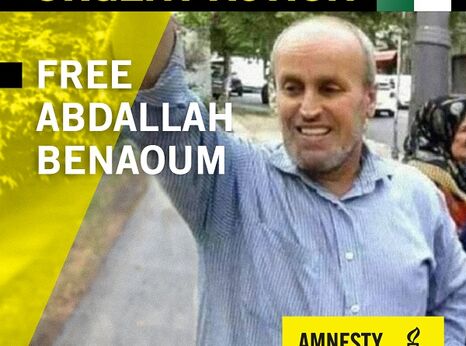Detained activist in critical condition

Abdallah Benaoum is a 55 years old political activist from Relizane, a town in the west of Algeria. He is among some 74 Algerians currently detained and facing charges for their role in the protest movement Hirak, which started in February 2019 to call for radical political change in Algeria but were suspended since March 2020 due to the COVID-19 pandemic. He was arrested on 9 December 2019, three days before the 2019 presidential elections, for Facebook posts that he published on his personal page criticizing the elections and the prosecution of peaceful Hirak activists. The prosecutor charged him with "insulting state institutions"; "undermining the integrity of the national territory"; "harming the national interest"; “undermining the moral of the army"; “attempting to pressure judges on pending cases” and "incitement to an unarmed gathering" under articles 146, 79, 97, 75, 147 and 100 of the penal code, respectively. None of these charges are legitimate offences under international human rights law since they impose undue restrictions to the right to freedom of expression.
In a letter that he sent out of prison through his lawyer recently, Benaoum describes his prison conditions and the inexplicable delay in medical treatment as follows:
“It is clear that this delay [of medical attention] … is a method of soft and slow execution and an attack on human and Islamic morals. As for the conditions of imprisonment, I am deprived of all my rights […] sleeping without blankets or pillow. I sleep on the bed and use my clothes as pillow. The institution argues that it can’t provide new mattresses because it does not have new ones. I am deprived of my right to read the newspapers, to know what is going on. I am suffering from a terrible isolation in the heart of Oran. Food is another calamity.”
Abdallah Benaoum suffers from clogged arteries; a chronic arterial disease which creates cardiovascular problems. In 2018, he underwent a first surgery which required that Benaoum maintain a healthy lifestyle after the operation. However, his prison condition and a hunger strike that he led in 2018 to protest prison conditions led to a deterioration in his health conditions.
Benaoum spent 15 months in prison in a previous case and had only been free for six months before his arrest in December 2019. On 2 April 2018, he was sentenced to two years in prison for several charges related to his Facebook posts, criticizing in particular the policy of "national reconciliation" under article 46 of the Charter for Peace and National Reconciliation of 2006, which prohibits publications about the Algerian civil war of 1990. He was released on parole on 3 June 2019, following a request from his lawyers.
The case file in his current prosecution indicates that the police in Oued Rhiou, in Relizane province, searched his house and confiscated his telephone and laptop. They went through both and the prosecutor used videos and publications found on his personal Facebook account to charge him, together with Khaldi Ali, another activist from Relizane, with six charges under the penal code. The file refers to videos of Benaoum calling for the boycott of presidential elections, and publications in which he says "no to military elections", "Hirak students in all governorates are faced with the harshest repression" and criticizing the light sentencing of a police officer for the killing of a young man in Oued Rhiou, as evidence that he is inciting disobedience and undermining state security.
At least two activists died in prison after a hunger strike to protest their detention for exercising their right to freedom of expression. On 28 May 2019, Kamaleddine Fekhar, a pro Amazigh activist and former president of the Ghardaia section of the Algerian League for the defence of human rights (LADDH) died in the Blida hospital while detained after 50 days of a hunger strike, to protest his detention for Facebook posts critical of the authorities. In another case, British-Algerian freelance journalist Mohamed Tamalt, 41, died in custody on 11 December 2016, in a hospital in Algiers, following a hunger strike to protest his imprisonment.